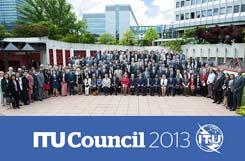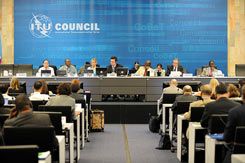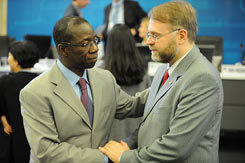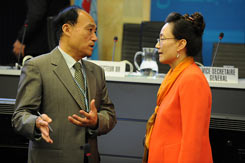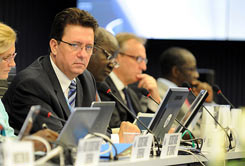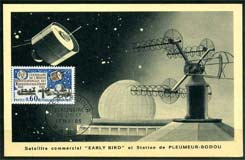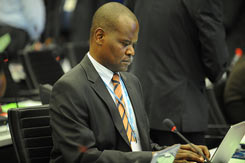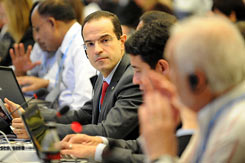
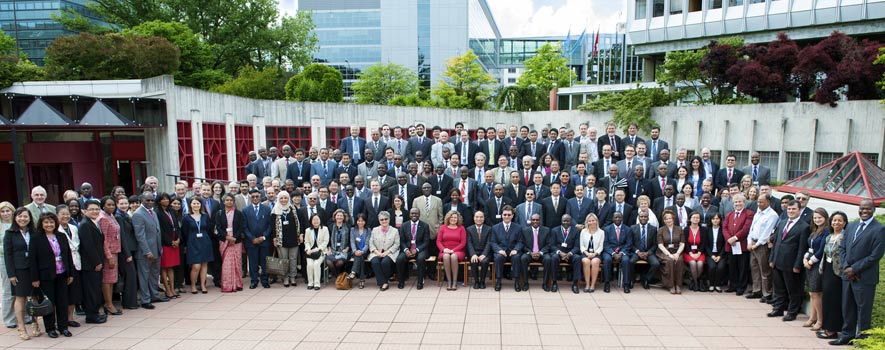
| « Previous | Next » | ||||||||||
|
|
|||||||||||
| Issue No. 2 | Geneva, 12 June 2013 | ||||||||||
|
|
|||||||||||
Thumbs up for ITU’s operational plans for 2014 -2017!The Council considered and approved the Union’s four-year rolling operational plans for 2014–2017, as detailed below. All four plans got the thumbs up for their high-quality information. They point to a very busy period ahead – starting in 2014, with the year’s many events including the sixth World Telecommunication Development Conference (WTDC-14) and the Plenipotentiary Conference (PP-14).
Radiocommunication Sector (ITU-R)The four-year rolling operational plan for ITU-R reflects the on-going work in the Sector and in the Radiocommunication Bureau (BR) responding to the wishes of the membership and continuing the introduction of results-based management. Presenting the plan, Fabio Leite, Deputy to the Director of BR, said that staff resources will be heavily involved in WTDC-14, PP-14 and in the preparatory work for the World Radiocommunication Conference in 2015 (WRC-15 ). Mr Leite underlined that the plan would serve as a guide for BR, taking into account the decisions of last year’s Radiocommunication Assembly (RA-12) and the World Radiocommunication Conference (WRC-12). The plan, he said, had been reviewed by the Radiocommunication Advisory Group in May this year. The plan comes in three main parts. Part 1 includes a description of ITU-R’s vision, mission, goal, and strategic objectives, as well as the key actions planned for 2014-2017. Part 2 provides details on the five set objectives and their associated outputs. Part 3 provides information on BR’s activities that support the Sector’s major objectives.
Telecommunication Standardization Sector (ITU-T)The four-year rolling operational plan for ITU-T reflects the outcomes of the World Telecommunication Standardization Assembly 2012 (WTSA-12). In particular, WTSA-12 adopted the first-ever ITU-T Resolutions on e-health, software-defined networking, e-waste, and engagement of academia in ITU-T’s work. Presenting the plan Reinhard Scholl, Deputy to the Director of the Telecommunication Standardization Bureau (TSB), said that areas in which ITU-T is now active cover optical transport, access technologies, quality of service, security, multimedia codecs, climate change, accessibility, cloud computing, Internet of Things, machine-to-machine communication, intelligent transport systems, IPTV, smart grid, smart sustainable cities, home networking and addressing, e-health, numbering, and conformity and interoperability. Mr Scholl
recalled the
strong backing
of WTSA-12 for
ITU-T’s
“Bridging the
Standardization
Gap” programme,
which endeavours
to increase the
participation of
developing
countries in
ITU’s work. A
revised
Resolution 44 on
“Bridging the
Standardization
Gap” requests
country-specific
guidelines on
how to implement
ITU-T
Recommendations,
especially those
with regulatory
implications. It
also mandates Councillors were informed that WTSA-12 and the Global Standards Symposium (GSS) that preceded it emphasized the importance of collaboration and cooperation with other standards bodies as well as vertical sectors (such as transportation, utilities, banking and health). Motivated by the conclusions of GSS, WTSA-12 passed Resolution 82 establishing a Review Committee to ensure that ITU-T’s structure continues to meet the needs of the continually evolving and convergent ICT landscape. The Review Committee will report to WTSA-16. Councillors were also informed that a new WTSA Action Plan had been produced to implement WTSA-12 Resolutions. Both this plan and the operational plan had been presented to the Telecommunication Standardization Advisory Group (TSAG) at its meeting on 4-7 June 2013. Mr Scholl underlined that “full implementation of the WTSA-12 Resolutions cannot be achieved with the current level of ITU-T resources, as all possible efficiency savings have already been made”. The additional funds needed to fully implement all the decisions taken at WTSA-12 amount to CHF 720 000 annually, as estimated by the WTSA-12 Budget Committee. Mr Scholl said that the TSB Director had appealed to the membership for voluntary contributions to fund extra activities of ITU-T. Voluntary contributions, whether in kind or monetary, can be used to fund specific projects, fellowships, or new initiatives. He added that TSB was “most grateful to the past contributors to the Bridging the Standardization Gap Fund, especially Nokia Siemens Networks, Microsoft, Cisco and the Korea Communications Commission.” Microsoft made another contribution to the fund this year.
Telecommunication Development Sector (ITU-D)For ITU-D, the outcomes of WTDC-14 and PP-14 will set the strategic and financial frameworks within which the Sector will organize its work plan and implement its work programme for 2014-2017. The four-year rolling operational plan provides the framework within which the mission and objectives of ITU-D will be implemented in 2014-2017. “It encompasses all relevant information regarding resource requirements, expected results and key performance indicators. In addition, key risk factors relating to objectives and outputs are also outlined,” explained Philippe Metzger, Deputy to the Director of the Telecommunication Development Bureau (BDT). Mr Metzger added that: “In preparing the plan, BDT has sought to respond to the expectations and priorities expressed by membership regarding the transparent, efficient, accountable and results-based management of ITU-D.” Key elements of the plan include:
The operational plan comes in four main parts. Part 1 provides a summary. Part 2 sets out details of the six major ITU-D objectives and their related outputs. Part 3 presents details of BDT’s activities. Part 4 contains a set of tables and charts showing resource allocations for 2014-2017, as well as definitions of key components of results-based management. Thanking councillors for their comments on the plan, Brahima Sanou, Director of BDT, said: “Every cent we spend should make a difference in people’s lives.”
General SecretariatThe four-year rolling operational plan for the General Secretariat is structured around six objectives and the corresponding outputs in the strategic plan for 2012-2015. It takes account of future challenges, key performance indicators, risk factors, expected results and planned activities. ITU Deputy Secretary-General Houlin Zhao presented the plan. Councillors were informed that budgetary constraints will require improved efficiency to implement all planned activities and to provide the highest quality services to membership. Mr Zhao said that under the plan, the General Secretariat would continue to modernize management practices and pursue a progressive transformation to a results-based approach that will include the implementation of performance and risk-management methods. The aim is to improve performance by linking information and resources to the strategic objectives of the Union as set forth in Resolution 71 (Rev. Guadalajara, 2010). This will better enable strategies to be aligned with operational plans, to actively monitor operations, and to improve collaboration across the Union. In order to achieve its objectives in a period of budget constraints, the General Secretariat plans inter alia to:
Key events to be organized by the General Secretariat during the four-year period covered include the annual WSIS Forums, annual sessions of the Council, and meetings of the Council Working Groups and PP-14. Support will also be provided to meetings of the Sectors and to TELECOM events. Concluding his presentation Deputy Secretary-General Zhao said: “Every cent contributed will be spent for the good of our members.”
Gearing up for ITU’s 150th anniversaryAt its 2012 session the Council had instructed the Secretary-General to start preparations for the Union’s 150th anniversary in 2015 and to encourage Member States to take actions to honour that historic milestone. Doreen Bogdan-Martin, Chief of ITU's Strategic Planning and Membership Department, reported on progress so far. She said that ITU had sent a circular letter inviting Member States to contribute to the elaboration of a programme of commemorative events and to a special fund to support celebratory activities. An intersectoral preparatory group, with representatives of all ITU Bureaux and General Secretariat Departments, has been set up and has held two brainstorming meetings on 22 March 2013 and on 30 April 2013. The group had put forward several proposals including:
Following Ms Bogdan-Martin’s presentation, the Council agreed to create a committee to steer the commemoration planning process. The committee will be composed of a chairman and five vice-chairmen from ITU’s five administrative regions. It will serve as a platform for gathering opinions and ideas about the planning of events. It will work closely with the ITU secretariat in the preparation of the celebrations and submit a progress report to Council 2014. Many countries expressed great support for ITU’s efforts and said they were gearing up for the anniversary celebrations. “We are the most enduring organization in the world by far and we should not be shy about it,” ITU Secretary-General Dr Hamadoun I. Touré told the Council. “I only hope that as former ITU Secretary-General, I will be invited to the celebrations,” he added jokingly, referring to the fact that his term of office will be over by then. Dr Touré urged Member States to send in their ideas on how best to mark the anniversary. Member States were also encouraged to organize national events to mark the occasion. Several councillors expressed the hope that the event would focus on the life-changing innovations witnessed in the field of communications since ITU’s beginnings. They recommended that the theme be chosen carefully in order for the milestone anniversary to have the impact it deserves, and that criteria for identifying “champions” be defined quickly. The Preparatory Committee’s terms of reference will be to:
ITU Strategic Plan and Financial Plan 2016-2019The Council decided to establish a working group to elaborate a draft Strategic Plan and a draft Financial Plan for the period 2016-2019. These plans would be considered by the 2014 session of the Council and later submitted to PP-14. Councillors subsequently endorsed the nominations presented by ITU Deputy Secretary-General of Mario Canazza (Brazil) as Chairman of the working group, alongside Dr Hyangsuk Seong (Republic of Korea) and Frédéric Riehl (Switzerland) as Vice-Chairmen. Following a proposal by Saudi Arabia, the ITU secretariat was invited to consider adding additional vice-chairmen so that all regions were represented on the Committee and to report back to the plenary on 18 June. Strong Council support was expressed for a proposal from Sweden to authorize Member States as well as Sector Members to participate in the discussions on both the Strategic Plan and the Financial Plan for 2016-2019. In previous cycles, Sector Members had not been invited to participate in Financial Plan elaboration proceedings. The working group has the following main terms of reference:
Free online access to ITU publications – Easy access, easy success?Some proposals on this topic from the Russian Federation (Document C13/60) and Brazil (Document C13/73) have received strong backing from the Council. One proposal from the Russian Federation “invites the Council to instruct the Secretary-General to ensure free online access to the ITU-R handbooks on national spectrum management, computer-aided techniques for spectrum management, and spectrum monitoring, via the ITU website without any restriction of access, and to examine the possibility of extending the list of documents of the other ITU Sectors available for free online access”. Brazil proposes the approval of free online access to the Final Reports of World Telecommunication Development Conferences, on a trial basis, from now until the Plenipotentiary Conference in 2014. Supporting this proposal, one country said: “Easy access means easy success.” The Russian Federation has been tasked to draft a decision that takes account of proposals from both documents for consideration in plenary next week.
Draft Budget of the Union for 2014-2015 tabled in plenaryThe 2014-15 draft Budget of the Union was presented to the Council by Alassane Ba, Chief of the Financial Management Resources Department, for review and approval. Several Member States expressed their appreciation for the concerted efforts made by the General Secretariat in preparing the budget and, in particular, the timely distribution of the drafts to Member States. The draft Budget (Document C13/10+Add.1) is based on the following main elements:
Efficiency measures to reduce expenses:
Additional information on the budget is provided in Addendum 1 to Document C13/10 and covers:
The General Secretariat will present a revised version of the draft Budget to include total mandatory expenses as well as WRC-15 and RA-15, as requested by the Council. Discussions on the draft Budget will continue in ADM Committee meetings.
Standing Committee on Administration and Management (ADM)Suspension/removal of Sector Members, Associates and academic institutions (Document C13/12)Sector Members and Associates who have not paid their annual contributions within six months after the due date are suspended from participation in ITU, in accordance with Resolution 152 (Rev. Guadalajara, 2010). In the absence of an agreed repayment schedule or of payment of contributions, these members are removed three months after the notification of suspension of participation. However, since January 2011, ITU management has not automatically removed previously suspended members in order to avoid a systematic loss of membership in such cases. The General Secretariat requests the administrations that approve the participation of Sector Members and Associates to maintain and increase the support they provide to ITU in following up entities in arrears. ADM Committee recommends that the Plenary take note of the suspension measures taken by the Secretary-General.
Improvement of management and follow-up of the defrayal of ITU expenses by Sector Members and Associates (Document C13/14)Resolution 152 (Guadalajara, 2010) instructed the Secretary-General to report to the Council on the management and follow-up of the defrayal of ITU expenses by Sector Members and Associates. Positive results were obtained after Council 2011 granted the Secretary-General flexibility in applying Resolution 152 to recover arrears, negotiate payment conditions and special terms and conditions for acquisitions. This has resulted in a better collection rate and significant reduction in the debt of Sector Members and Associates. A number of councillors expressed their support for the Secretary-General to continue using that flexibility in negotiating members’ debt payment terms. ADM Committee recommends that the Plenary take note of the Secretary-General’s report on the improvement of management and follow-up of the defrayal of ITU expenses by Sector Members and Associates, and endorses the recommendations contained in the report.
Arrears and special arrears accountsThe General Secretariat reported on the status of arrears and special arrears accounts as of 31 December 2012 (Document C13/11).The total arrears, special arrears accounts and cancelled special arrears accounts have dropped significantly from CHF 72.7 million as of 31 December 2005 to CHF 60.6 million as of 31 December 2012 – a 16.6 per cent reduction. Actions taken by
the
Secretary-General
to reduce
outstanding
amounts include
special
reminders and
making use of
opportunities
during
conferences and
meetings, as
well as efforts
through the
Union’s regional
offices.
Not an official document – For information only. |
|
||||||||||
